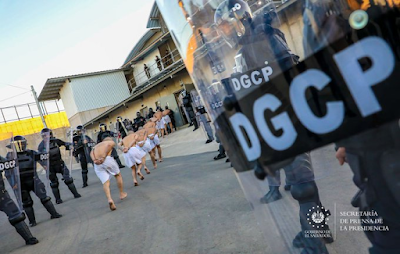More coverage of the State of Exception after One Year
A week ago I shared a large number of articles written about the one year anniversary of the State of Exception highlighting both the evaporation of gang control in territories across the country and the abuses of the security forces and justice system. Even more has been published on a variety of topics surrounding the security regime, and I gather many pieces in today's post.
RevistaFactum along with ElimTV published a series of video interviews and a collection of the basic facts surrounding the State of Exception in a special section on the Factum website. The interviews include a vendor from the central of San Salvador who describes how much safer she feels, and an interview with a mother whose son was a victim of an arbitrary detention. Also included are interviews with an investigative journalist, an academic researcher, and Pastor Mario Vega of Elim Church.
El Faro has made its extensive review of the first year of the State of Exception available in English here.
In a new article, Carlos Martinez at El Faro describes the cautious steps taken by a community, formerly divided by a gang boundary enforceable by death, where now it is possible to schedule a soccer match on the community field with players from both sides of the boundary.
A similar set of stories appear in a lengthy piece at BBC News Mundo titled Before we were under siege: the neighborhoods of El Salvador that are reunited after the "disappearance" of the gangs due to the Bukele war. Like other stories about the disappearance of the active presence of the gangs in the face of the State of Exception, the BBC report starts with the story of a soccer match attended by community members from different sides of gang borders. The story also explores the history of the State of Exception and the denunciations by local and international human rights groups of abuses committed by the regime.
The BBC also published a new interview with Salvadoran Vice President Felix Ulloa focused on the anniversary of the State of Exception. Ulloa denies that human rights are being violated, indicates that some mistake may have been made but are being rectified by the courts, and leaves open ended when the State of Exception might be brought to an end.
The conditions of incarceration in El Salvador's prisons have resulted in the deaths of more than one hundred persons and almost half died as victims of violence while in custody according to a new report by Socorro Jurídico Humanitario (Humanitarian Legal Aid). Another 30% died from lack of medical attention according to the group, and 92% of the dead were not members of any gang they say.
There was a demonstration on March 28 reports EFE by family members of those persons said to have been arbitrarily and unjustly detained under the State of Exception.
A report by journalist Héctor Silva Ávalos in Infobae describes the existence of a corruption network within the prison system where payments of more than $1000 by a family member can arrange a visit with a loved one in prison and other corruption involving the delivery of food and hygiene packets to prisoners.
Rhina Guidos writing in the National Catholic Reporter describes Roman Catholic priests and Cardinal Gregorio Rosa Chávez who used the proximity of the March 24 anniversary of Oscar Romero's assassination and the first anniversary of the State of Exception to critique both the government measures and the relative silence of the Salvadoran bishops conference and the archbishop of San Salvador, Jose Luis Escobar Alas, in the face of the regime.
Manuel Meléndez-Sánchez writes in Lawfare, Bukele Has Defeated El Salvador’s Gangs—for Now. How? And What Does It Mean for the Region?

Comments